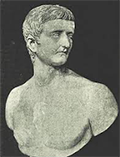Tiberius: Second Emperor of Rome
Tiberius was the second Emperor of Rome. Known as a successful soldier and administrator, he was a reluctant emperor who preferred to consolidate Rome's gains rather than expand its frontiers. 
He was born on Nov. 16, 42 B.C. on Rome's Palatine Hill. When Tiberius was 4, the first Emperor, Augustus, decreed that he wanted as his wife Tiberius's mother, Livia Drusilla. She was still married to Tiberius's father, Tiberius Claudius Nero, and so the two divorced and she married Augustus. Tiberius Nero died when young Tiberius was 9, and son delivered the eulogy at father's funeral. Tiberius had a very good education. The boy learned Greek and Latin and studied rhetoric and other subjects with famous educators. He was later a successful lawyer and also served in government, working his way up from quaestor to praetor to consul. He also served as governor of the province of Gallia Comata for a time and scored a handful of victories over the Germans and other Roman enemies. In 19 B.C., Tiberius got married, to Vipsania Agrippina, whose father was the famous general Agrippa. Tiberius and Vipsania had a son, whom they named Drusus Julius Caesar. Eight years into their marriage, Tiberius and Vipsania had to divorce, again at the command of Augustus, who wanted his stepson to marry his own daughter, Livia Julia. This was not a happy marriage: Husband and wife detested each other and produced no children. She engaged in publicly embarrassing behavior and was later exiled. Tiberius proved a worthy soldier, leading Roman soldiers against the Cantabrians and then the Gauls. Like many successful commanders, he received a triumph in Rome, in 7 B.C. The following year, however, he left the army and went to live on the island of Rhodes, in self-imposed exile. He stayed there eight years and adopted the ways of the Greek people living there. He tried to return to Rome but was denied permission to return by the emperor himself, angry at his stepson's disappearance from Rome and nervous about having a stable succession. Tiberius's mother arranged for him to come back in A.D. 2, provided that he promise not to seek political office. Two years later, Augustus, after seeing both of his adopted sons die and again wondering who would succeed him on the throne of Rome, adopted Tiberius and gave him a share of imperial power. Tiberius was tasked with bringing into line two different sets of people in revolt: the Illyrians and the Germans. He was successful at convincing the Illyrians to submit to Roman authority and was voted a triumph; he postponed that triumph however, because of what happened with the Roman force sent to Germany. A large force led by Publius Quinctilius Varus, consisting of three legions and a number of auxiliaries, suffered a devastating defeat in A.D. 9 at the Battle of the Teutoburg Forest. In A.D. 12, Rome's consuls declared that Augustus and Tiberius were co-princeps, officially sharing all power. When Augustus died two years later, Tiberius succeeded him as emperor. He waited for a time, out of deference to the beloved first emperor. 
Many Roman sources say that Tiberius didn't want to be emperor. A good administrator, he had no burning desire to extend the boundaries of the Empire, preferring to shore up the frontiers and keep them stable and strong. He knew that the reign of Augustus had depleted the royal treasury, and he set about improving the fiscal system and rooting out corruption. He was a successful general and preferred to avoid the trappings of imperial pageantry that Augustus had enjoyed. He also had to deal with an interfering mother: Livia was very happy for her son to be emperor and had plenty of advice for how to do it; she also had plenty of powerful friends. In desperation, Tiberius imposed another exile on himself, moving to the island of Capri in 26, leaving in charge the prefect of the Praetorian Guard, Lucius Aelius Sejanus. When his mother died, in 29, Tiberius did not return for the funeral. The emperor-in-all-but-name eventually overreached his power, and Tiberius had him executed for treason, in 31. As emperor, Tiberius made liberal use of the treason accusation, condemning many enemies to death. He also came to distrust the Senate and exerted more power over that body than had Augustus. He is said to have approved or engaged in many acts of cruelty in his later years. With his main rival out of the way, a stubborn Tiberius remained on Capri. His adopted grandson Gaius (known as Caligula) came to live with him, and grandfather included grandson as his co-heir. Caligula's father was Germanicus, Tiberius's nephew. Tiberius had earlier intended Germanicus to succeed him; he died in 18. Tiberius's own son, Drusus, died five years later, leaving Drusus's son, Tiberius Gemellus, as Tiberius's only living relative; he it was who was the other heir to the throne. Tiberius died on March 16, 37, having ruled for 23 years. Some historians say that Caligula had a hand in his grandfather's death.
|
|
Social Studies for Kids
copyright 2002–2026
David White




